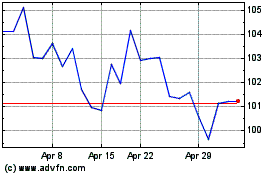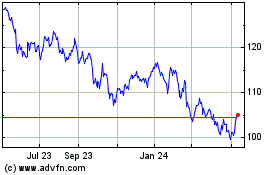By Saabira Chaudhuri
Comfort foods from big brands are seeing a resurgence,
executives say, as consumers seek familiarity and convenience amid
the coronavirus pandemic.
Many shoppers have favored fresh and specialty brands over Big
Food's processed products in recent years, while others have opted
for cheaper store brands. Now, the world's largest makers of
packaged foods say frozen pizza, pasta sauce, and mac and cheese
are rising in favor as consumers in lockdown eat at home.
Nestlé SA became the latest to detail the trend Friday when it
reported stronger organic sales growth for the first quarter driven
by Americans stockpiling its DiGiorno pizza, Stouffer's frozen
meals and Hot Pockets sandwiches. Baking brands like Toll House and
Carnation also performed well, it said.
Demand for those products -- as well as Purina pet food, Nescafé
coffee and Gerber baby products -- drove a 7.4% rise in organic
sales in the Americas in the first three months of the year and
helped outweigh weakness in China.
Overall, the world's biggest packaged foods maker said organic
sales growth -- a key measure that strips out currency changes,
acquisitions and divestments -- rose 4.3% in the first three months
of the year, beating analyst estimates of 3%.
Nestlé Chief Executive Mark Schneider said the company's food
and drink brands "provide comfort" to consumers, echoing recent
comments made by executives across the industry.
As consumers eat three meals a day at home, rather than at
office cafeterias, schools and restaurants, demand for easy-to-make
foods has risen, company and independent data show. Executives have
said they expect restaurants to operate at lower capacity for
months to come because of social distancing protocols, meaning the
shift to cooking at home could last even as lockdowns lift.
Overall, U.S. store sales of soup rose 37%, canned meat climbed
60% and frozen pizza jumped 51% for the week to April 11, according
to research firm Nielsen.
Earlier this month, Kraft Heinz Co.'s Chief Executive Miguel
Patricio said almost all of the company's brands were in high
demand, including Mac & Cheese, Classico pasta sauce and Oscar
Mayer bacon and hot dogs. That resurgence comes after the company
last year wrote down the value of some of its big brands and said
in February it would boost advertising spending to win back
consumers.
Unilever PLC on Thursday said some of its older brands, like
Hellmann's mayonnaise, have performed well in the first quarter
amid the pandemic.
"We've seen time and time again that big brands tend to do well
when people are feeling anxious and under threat," Chief Executive
Alan Jope said. He added that he expects the shift to larger brands
to last a couple of years.
Campbell Soup Co. last month said retailers were buying more of
its canned soup as well as products like SpaghettiOs and Swanson
canned chicken.
Big food makers have been squeezed at the higher end from niche,
local food brands as well as at the lower end by more affordable
store brands. Companies including Nestlé, Kraft and Unilever have
been snapping up the makers of organic tea, plant-based products
and high-end ketchup, and selling legacy businesses like cold meats
and spreads in an attempt to compete better. Frozen food has been a
particular focus for Nestlé, who has worked to cut salt, sugar and
other less healthful ingredients from its ready-made meals.
Barclays analyst Warren Ackerman this week said the pandemic is
also attracting new shoppers to brands, helping brands from Nestlé
and Unilever increase their penetration in the U.S. "Whether these
brands can retain new consumers over the long-term remains a
question, but mature categories acquiring new consumers is a rare
phenomenon," he said.
For Nestlé, the strong performance of its food brands in
developed markets in the first quarter offset weaker sales in
China, where organic sales fell for ice cream, peanut milk and
confectionery. Nestlé's business that sells ingredients to
restaurants also suffered as the country battled coronavirus.
Nestlé confirmed that it would explore a sale of its Yinlu
business, which sells peanut milk and rice porridge in China after
years of efforts to jump-start growth have floundered. The arm
generated sales of 700 million Swiss francs last year.
Like Unilever, some of Nestlé's businesses were hurt by
lockdowns that have forced consumers to stay indoors, including its
ice cream arm and confectionery business.
Overall, sales fell 6.2% to 20.81 billion Swiss francs ($21.29
billion) because of currency changes and mergers and acquisitions.
Despite uncertainty over the pandemic, Nestlé maintained its
full-year guidance, saying it expects organic sales growth to
improve.
Analysts welcomed the forecast -- in contrast to rivals that
have scrapped guidance amid the pandemic -- and said that while the
first quarter numbers benefited from stockpiling, which will tail
off, Nestlé's performance was strong.
Write to Saabira Chaudhuri at saabira.chaudhuri@wsj.com
(END) Dow Jones Newswires
April 24, 2020 09:55 ET (13:55 GMT)
Copyright (c) 2020 Dow Jones & Company, Inc.
Nestle (PK) (USOTC:NSRGY)
Historical Stock Chart
From Mar 2024 to Apr 2024

Nestle (PK) (USOTC:NSRGY)
Historical Stock Chart
From Apr 2023 to Apr 2024
